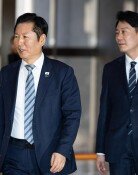[Editorial] Budget Reform Needs Acceleration
[Editorial] Budget Reform Needs Acceleration
Posted December. 23, 2008 05:47,
An inspection by the Board of Audit and Inspection has found that the Education and Human Resources Development Ministry (now the Education, Science and Technology Ministry) spent a whopping 822.9 billion won (625.8 million U.S. dollars) for unexpected purposes last year. The amount was 87 percent of a special adjustment grant worth 944.6 billion won (718.3 million dollars). High-ranking ministry officials including the minister and vice minister gave 1.3 billion won (988,600 dollars) to encourage schools they visited from 2004 to May this year. A senior official suggested that not only the minister and vice minister but also seven directors should be allowed to use the money to encourage schools. Part of the grant also went to their alma maters. They spent taxpayers money to show off their power and strengthen their relations.
When preparing to run for president in February last year, President Lee Myung-bak said, I can cut 20 trillion won (15 billion dollars) of the governments budget without difficulty. While Seoul mayor, he applied the philosophy of corporate management to the municipal government and cut the citys fiscal deficit by around three trillion won (2.28 billion dollars). Though he began many large-scale projects such as the restoration of Cheonggye Stream, reform of the transportation system, and the construction of new towns, Seoul Forest and Seoul Square, he cut the citys fiscal deficit. Accordingly, many Koreans have high expectations for the presidents promise to cut the state budget by 20 trillion won (15 billion dollars).
Im seriously worried over squandering and inefficiently using public funds that can accompany the governments rush to execute the budget, he told a meeting with ministers yesterday. The Education Ministry, however, is not the only ministry that wastes tax money. President Lee should implement an effective system that thoroughly inspects the execution of budget and prevents officials from misusing public funds.
The government will spend 70 percent of next years budget in the first half to boost the economy. In line with the effort, officials will receive exemption from liability for budget spending in the interest of reviving the economy. If money is spent for unexpected purposes, however, Koreans will have to bear a heavier burden. If subsidies including those for the underprivileged and the unemployed are not managed thoroughly, the budget will not be used efficiently.
As the government says, the pace of budget execution is significant, but more important is the pace of reform to prevent officials from misusing budget.







